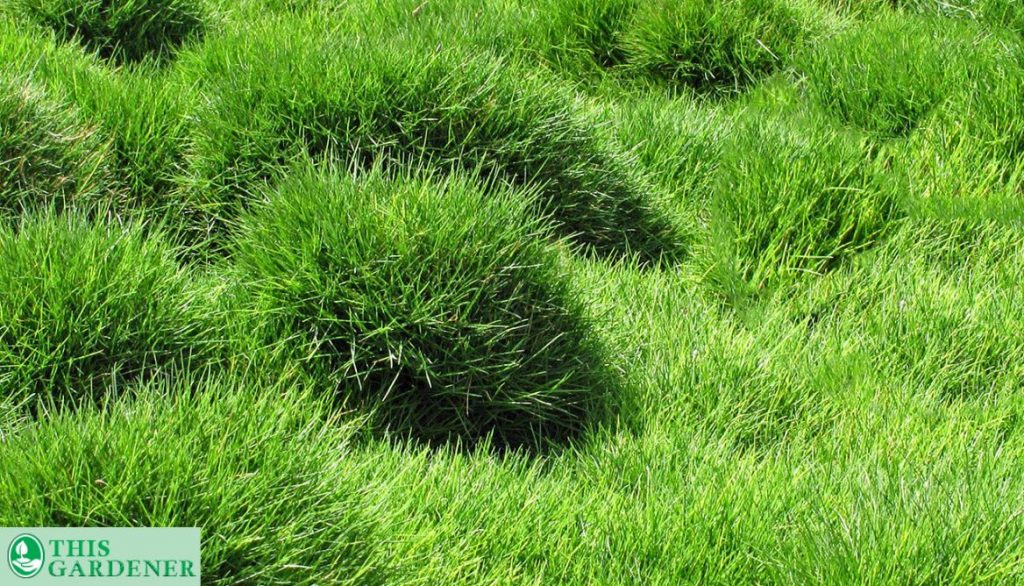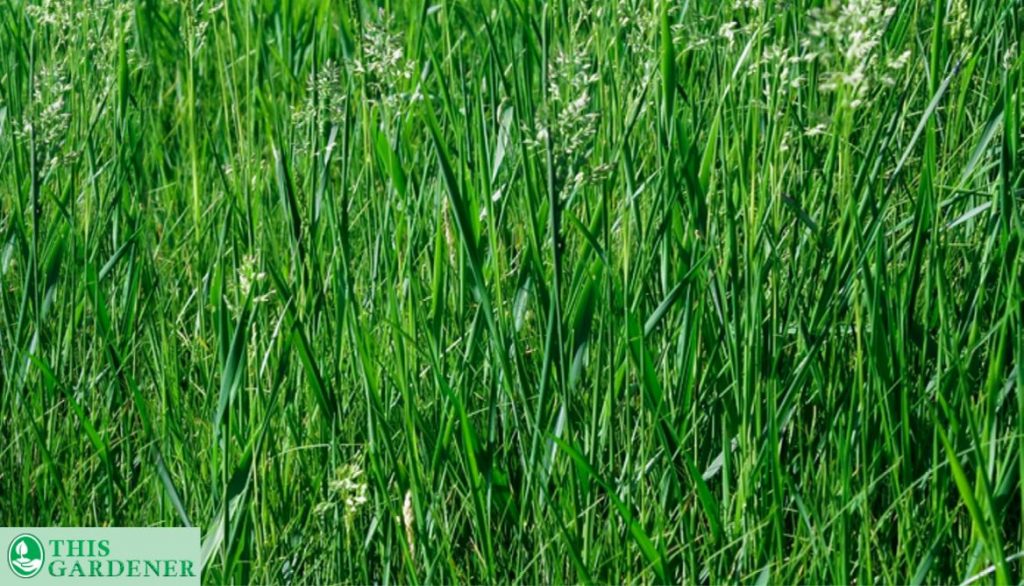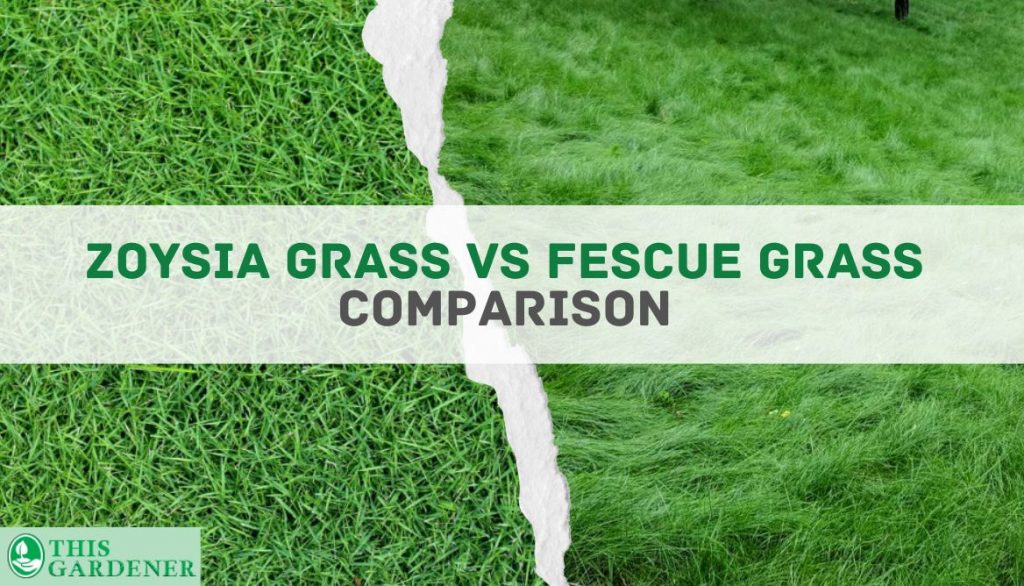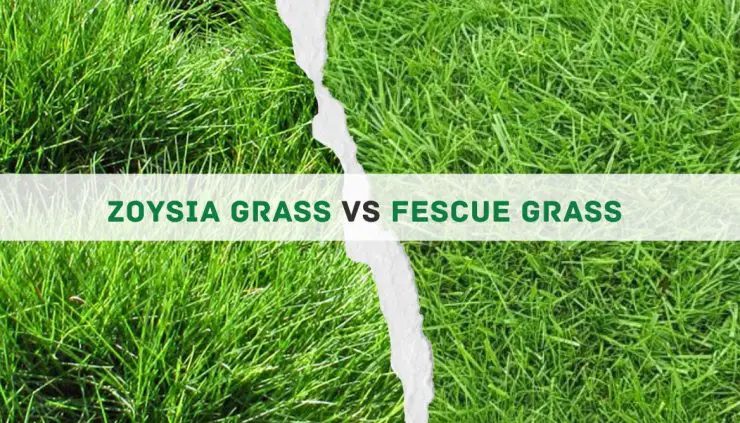Lawn owners have had a really long argument about grasses and the advantages many types of grass offer as lawn turf. Similar is the case for the Zoysia grass vs fescue scenario!
- Many lawn enthusiasts side with zoysia being a resilient grass while many prefer fescue for its resistance.
- Many people point out the shade tolerance of zoysia. Fescue seems to be better with shade overall.
- Soil condition needs are better for fescue as it can even accommodate poor soils while zoysia is very picky!
Let’s hop into the details so we can find out which one of these grasses stand tall.
Contents
A Quick Comparison of Zoysia vs Fescue grass
The grasses grow and spread at their own pace. Each grass has its own strong areas and weaknesses. Let’s look at what zoysia grass and fescue have as their main feature:
- If your home, business, or workplace has heavy day-to-day foot traffic on the lawn then zoysia is hands down your winner!
- Comparing zoysia grass with fescue in terms of shade is silly. As fescue will always win this competition.
- Although, both kinds of grass look awesome as turf grass zoysia is suitable for a thin but complete carpet while fescue is suitable as a perfect turf type.
Key Differences Between Zoysia vs Fescue grass

Features that set both types of grass apart:
Parameters | Zoysia Grass | Fescue Grass |
Color: | Greyish-green | Rich green or dark green |
Leaf Type: | Thin Leaf with a fine coarse texture | Broad and flat |
Sunlight: | Full Sun | Full Sun |
Shade: | Partial shade | Tolerates shade |
Preferred Areas: | Southern Regions of the US | South Carolina and Eastern Columbia |
Seed heads count: | Average | Average |
Soil type: | Slightly acidic sandy soil | Compatible with various soils |
What is Zoysia?

Zoysia is a very competitive warm season grass that is a very unique species among all the warm season grass. It spreads in such a way that it looks like something out of an alien movie! Its root system consists of rhizomes and stolons. They are not friendly with other grasses!
Identifying Zoysia as a Warm Season Grass
Let’s spot some interesting qualities of this turf grass!
- It grows via rhizomes & stolons. Amazing right?
- It grows very fine texture leaves.
- Greyish-green is the dominant color of the leaves.
What is Fescue grass?

It is infamous as the most awesome cool season grass that you can choose from. Fescue grows in a bundle-like manner with long grass stems and rich green leaf blades famous as pasture grass.
Identifying features of Tall Fescue grass as a Cool Season Grass
- Rich and bright colored leaves.
- Aesthetically pleasing appearance.
- Broad and flat grass blades.
Comparing Zoysia vs Fescue grass

Let’s put these grasses side by side and compare them!
Tall Fescue:
- Fescue species are known for their beauty and versatility. It is perfect among all the grasses for your lawn. Thick & rich turf makes it too good to be true and sometimes it looks like synthetic turf.
- Having shade tolerance and being drought tolerant is a huge advantage.
- Tall fescue is a highly preferred grass as it has finer blades and a darker green texture.
Zoysia Grass:
- Zoysia grass is a slow-growing but very stable grass.
- If you love grasses of different colors then this is your choice as it is available in bright green, emerald green, and greyish green!
- While some grasses grow via only stolons. This grass species will spread via stolons & rhizomes.
Appearance
If you want to quickly spot tall fescue then be sure to look out for a bundle-like growth from bottom to top. And also make sure to check its deep green color.
Zoysia Identification
Fescuegrass Picture
Weeds, growth and sod formation
Zoysia and fescue both are excellent against weeds. While fescue is competitive in nature you can expect zoysia to compete well once it is established well into the lawn.
Be it summer months or clear winters, both plants will maintain their growth but might suffer under certain circumstances.
Best Uses for Zoysia grass vs Fescue grass
Golf courses often prefer zoysia for its high tolerance to traffic. High traffic areas are not a problem for this tough grass.
Being a rich and fast-growing grass, this makes fescue a suitable candidate for the food of the livestock.
Soil Types and pH Needs
During the growing season, fescue needs a pH level of 5.5 to 7.0 and can easily grow in various soil types. It can easily adjust in low maintenance conditions.
Zoysia has a different story! zoysia prefers slightly acidic soil type and a pH level of 6.0 to 6.5 is the ideal condition in which zoysia grows.
Water Needs
You can expect the water needs of both types of grass to be the same. Be it hot weather or cold weather, they require a 1″ level of water per week. But Zoysia demands more water at times.
Fertilizer requirements
Fescue does not demand a high amount of fertilizer as it will only need it once during fall than in spring. An amount of 1-3.5 pounds of high nitrogen fertilizer is enough for a 1000 sq ft area.
Zoysia is a high maintenance grass that wants high nutrients to maintain its natural state. The initial amount of fertilizer might be low but ultimately you end up spending more to keep it healthy.
Sun, Shade, and Temperature Requirements
Zoysia and fescue can withstand the full sun for a long time as well as high temperatures.
The difference arises when there is shade, fescue has no issue with shade but zoysia will die even in partially shady conditions.
Durability
Tall fescue has high foot traffic tolerance and it recovers quickly from any damage due to foot traffic. You will need to rarely cost effective ideas for its damage recovery. It is hassle-free turf grass.
As a growing grass, zoysia thrives but once fully grown it has exceptional durability against foot traffic.
Common Pests and Diseases
Common pests that attack fescue are grubs, armyworms, sod worms, and cutworms. It suffers from brown patches, grey leaf spots, & seedling disease if not taken care of properly.
Zoysia is usually invaded by pests such as grubs, beetles, &webworms while diseases such as mildew, mold, & fungus can make it suffer.
Mowing Needs
Zoysia is like a baby when you have to mow zoysia. It needs more than average lawn care and frequent mowing. It needs to be mowed to 1″ and a minimum of 4 times per year.
Meanwhile, fescues will need to be mowed down to about 2-4 inches. Using a very sharp blade on your mower will give a high-quality trim and a beautiful appearance.
Note: None of them will ever be needed to mow to a very small length of half inches or so.
Cost of Maintenance
If you are thinking of the maintenance cost, zoysia grass will dig deep into your pockets. It demands a high amount of fertilizer, frequent watering, & lawn care.
Fescue is a very easygoing lawn grass that has a solid appearance and does not need a very caring lawn care routine. Mowing height is much more easily maintained. It can easily stay alive with low maintenance.
Zoysia vs Fescue: Which Option is Right for You?
When finalizing a grass species for your lawn then make sure to take into account some important specs. Weather type, soil conditions needed, watering requirement, & durability against foot traffic, pests, diseases as well as drought. If you have carefully analyzed these things then you are good to go!
Choosing the Best Option for Climate
Surprisingly, fescue is a cool season grass but can withstand high temperatures. It has an advantage during summer and winter both.
Zoysia grass can thrive in the hot season but it has an advantage during winter. It develops brown patches and stays in that condition during the whole winter. If you are someone who loves a green lawn then do not opt for zoysia.
Growing zones
Climate zones identified by USDA for tall fescue are zones 4 to 7. Zoysia grass is a very versatile grass in terms of climate. It requires a temperature of about 80 Fahrenheit and above while growing zones are 6 to 11.
Summary: Tall fescue takes the lead in this aspect!
Choosing the Best Option Based on Maintenance
If you are calculating the maintenance cost then you are in for a surprise. Zoysia grass requires a lot of maintenance in terms of mowing, fertilizer, and watering. Even its sod is very pricy.
Taking into account tall fescue, this grass requires less water, does not need a lot of fertilizer, & sits well in shade or sunlight.
Summary: Sorry Zoysia! Tall fescue is our choice here!
Choosing the Best Option Based on Susceptibility to Pests and Disease
If you talk about pests and diseases then these two grasses will gauge equally n this area. You need to look at other areas. But in terms of overall performance, tall fescue wins the race!
Summary: Tall fescue has been crowned the winner again!
What are the similarities between Zoysia vs Fescue?
Coarse texture fescue or seasonal plant zoysia, give it as many names as you want. They both are unique in their own ways.
They both might have many differences but some of the amazing features are commonly shared by both of them.
Foot traffic
No need to worry about damaging the grass when walking on the grass. It can take pretty hard hits and stay healthy.
Watering Demands
The level of water that they need is the same about 1″ per week.
Pests and Diseases
Sadly, fescues and zoysias are both the target of diseases and pests. This is the only weak point for them both.
FAQ
Is Zoysia more expensive than fescue?
With a green signal, yes! Zoysia is more pricey than Fescuegrass. The main reason is its availability only in sod form and not in seed form.
Can you mix fescue and Zoysia?
Mixing it with a less aggressively growing grass species is a bad idea. Zoysia will not take over during the summer season. But during winter, it will start to dominate tall fescue grass.
How To Encourage Zoysia To Choke Out Fescue?
Sprayed a chemical spray right when tall fescue’s dormancy ends. Stopping the optimum irrigation quantity for tall fescue, and mowing down to 1″-2″ to cut down the tall fescue crowns will be ideal to allow Zoysia to grow.
How To Encourage Fescue To Choke Out Zoysia?
Mowing it to a suitable height for tall fescue so that it shadows zoysia. Irrigate tall fescue enough that it outgrows it. Dig up the zoysia to damage as much root system to stop its growth. Finally, supply 2-4 lbs of fertilizer rich in nitrogen at least twice a year.
How can you tell Zoysia from fescue grass?
Zoysia has a very dense turf and another easy way is that zoysia has surfaced roots.
What kills Zoysia, not Fescue?
A suitable herbicide will eliminate zoysia! And tall fescue will remain safe all this time. This is one of the safest ways.
Conclusion
The whole in-depth study of both turf kinds of grass brings us to the concluding statement that one is a poor man’s heaven and the other is a king’s choice!
Fescue has shown remarkable traits overall and is cost-effective in terms of maintenance. While Zoysia is a very expensive and pricy grass to maintain.
We hope that you will learn a lot from our findings. Which grass did you select for your lawn? Let us know in the comments section! We are always motivated to read your feedback and help you in this matter!
References
- https://lawnmowerguru.com/zoysia-vs-fescue-grass/
- https://shuncy.com/article/what-are-the-difference-between-zoysia-grass-and-fescue
- https://thrivingyard.com/zoysia-vs-fescue/
- https://househomeandgarden.com/zoysia-vs-fescue-grass/
- https://www.formlainc.com/resources/wetdry/zoysia-vs-red-fescue/
- How to Get Potatoes to Sprout Eyes: Detailed Growing Guide with 3 Options - July 31, 2023
- Weight of a Medium Potato: Revealed in Detailed Guide - July 29, 2023
- Maris Piper Potatoes: 9 Substitutes You Should Know About - July 27, 2023
Hello! I’m Jessica Zander, a garden coach and consultant based in the Boston area (zone 6b), offering virtual consultations across the country and Canada.
I’ve been passionate about gardening since the early 1990s, and in 2022, I launched You Can Do It Gardening to empower individuals to feel more confident in their gardening endeavors.
Following a 30-year career in nonprofit finance and operations, I transitioned out of that field in mid-June of 2023 due to the growing demand for coaching services. Interestingly, my years of presenting financial statements to boards and finance committees proved to be valuable experience for teaching people about gardening! I enjoy sharing skills, providing guidance and suggestions, and collaborating efficiently with clients to make significant improvements to their outdoor spaces, both small and large. I also regularly teach at the Arlington Continuing Education and Cambridge Adult Education.
My approach is direct and practical, akin to Mary Poppins, but tailored to your garden. Clients find satisfaction in saving money and taking pride in their own gardening achievements.


Add comment